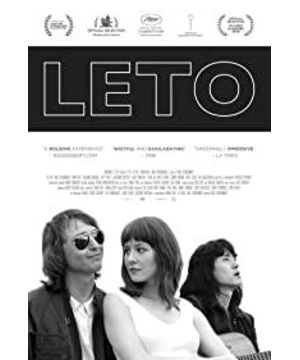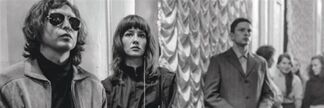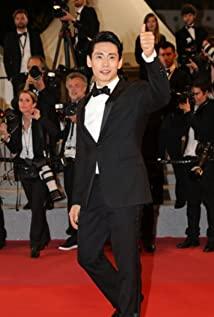The only black-and-white film in the main competition at Cannes this year, one of them, "Midsummer" (the other is Paul Pawlikowski's war love "Cold War"), is a film about music, about characters, and one is not so The biographical music biopic tells the history and re-creation of the former Soviet rock pioneer Viktor Choi mixed with persistence, resistance and personal affection before he became a banner figure.
The film does not focus on the cries of Choi that rock fans are fond of, nor the hardships of Kino's lead singer's creation, nor the public resistance to ideology inspired by the political system of the former Soviet Union. The director also seems to have avoided most of the political content of the era. Even if it is unavoidable, he tries his best to supplement it with music, so that the rebellion against the era can be expressed in music. In addition, the so-called retro graffiti-style MV is interspersed in the film. It's easy to fall into the musical expression that the director deliberately created, but when it comes to music, it's about emotions. Once the emotions come up, the music has no charm. Besides, this is rock and roll that expresses extreme emotions.
Therefore, this biopic, which does not focus on the glorious moments of Victor Cui, does not seem so gorgeous, but it limits the resistance, removes the madness, and uses progressive private emotions as the main line of alternative rock expression, which makes it appear So wonderful.
Former Soviet rock godfather Victor Choi
Victor Cui was born on June 21, 1962 in Kekiurda, Kazakhstan. His father was Korean and his mother was Ukrainian. Victor Cui arrived in Leningrad when he was very young. In the high-flying era, after entering Leningrad, there was no longer a peaceful and tranquil life. Victor Cui Zengjin was admitted to the Serov Academy of Fine Arts. The ten years during his university days were also the ten years when the political system of the former Soviet Union was crumbling. During this period, as a student, Victor, who was full of yearning for freedom, began to write songs and composed rock music that was regarded as a betrayal of the country at the time. During the period, rock music, which was almost free, anti-repression, and ultra-human at this time, naturally became a strong emotion expressed by young people in the former Soviet Union in the late 1970s and early 1980s against the stereotyped and formalistic realpolitik. Victor Choi was expelled from the school for entering a field that the school leaders banned students from entering, and he went to a specialist art school and continued to create his own rock music.
"Midsummer" describes Victor Choi, who was still in school and formed the "Galin and Hyperbola" band. The lead singer mike created for Cui and his classmates, and accidentally met Boris Glebenshkov, the lead singer of the best contemporary rock band "Akvarium" in the former Soviet Union, and Cui's music career took off. High-speed train, joined the rock music association, and formed Kino, one of the greatest bands in the history of rock in the former Soviet Union. With the support of Boris, Kino's first album "45" was released. Since then, Victor Choi and his Kino embarked on the road of opposing illiberal and rigid dogma. He used his rock weapon to lead the youth of the former Soviet Union to defend love and friendship, love for peace and express political demands for change and innovation. Gorbachev once met Victor Choi himself and said eagerly to him: "Reform and the people need your strength, let's work together!" .
Constant creation and confrontations with conservatives almost filled Cui's rock career. The year before the collapse of the Soviet Union and the year before the world-renowned Red Square rock festival in Russia, Victor Cui left him in a car accident for a short time. On the second day, all the reformist newspapers covered the departure of a generation of rock pioneers. The young people of Moscow chose Arbat Street as a place to commemorate the singer. On the crowded Arbat Street, they found a wall to put This place is regarded as a permanent memorial place, which is why Victor Choi's face is often seen on the streets.
"Victor Choi means more to the youth of our country than any politician, celebrity or writer. Because he never lied, never got paid for - he never changed. He's the only rock star who looks like reality. , his life was as his songs sang, he was the last rock and roll hero ," wrote the radical reformist Komsomolskaya Pravda the day after Victor's death.
P.S. Cui's "Blood Type" with the Afghan War as the Background:
A gentle comfort zone, but the streets await our footsteps.
The dust on the boots is like starlight...
Comfortable sofas, checkered sofa covers, and untimely triggers
The sunny days are just in bright sleep
There are means to pay the price, but I don't want a cheap victory
I don't want to trample on anyone's chest
I want to be with you, I just want to stay with you
But the stars high in the sky call me on my way
I have blood type on my cuff
I have my bugle on my cuff
Pray for me running into the battlefield, pray for me
don't leave me on the field
don't let me lie on the field
pray for my victory pray for my victory
That summer, no politics
The name of the film "Midsummer" comes from a song written by zoopark's lead singer Mike. However, except for a riverside playing in the water in the first half of the film, the breath of midsummer is hard to find. On the eve of the change, social relations are highly tense, where can there be midsummer? , Even if the characters wear short sleeves and show their arms, the chill of society is pervasive through black and white tones . Rock and roll, which was incompatible with the mainstream of society, is now a utopian belief of young people. Immersed in the center of rock, it is indeed another summer. .
The combination of passionate rock and black and white images is the freshness brought by "Midsummer". In Leningrad in the early 1900s, the black-and-white images seemed like the director deliberately created an atmosphere of memories to include you and me in it. The surrounding social and political uneasiness was not so clear after the black and white tones were blended in. The only spark came from Lenin. Greer's group of young people who look like madmen and their devout love of rock music. The 1970s was the golden decade of rock and roll development. Queen, Davide Bowie, GN' R, T-Rex and other singers or bands made these 10 years marked. The brand of rock and roll, at that time rock and roll represented a kind of spirit, which came from rebellion and freedom in the heart, but in the disintegration of the former Soviet Union, rock and roll is no longer what it used to be, and the strong political meaning makes rock more like a weapon. A spiritual weapon, it played red, roared with anger, and the revolutionary blood flowed between its fingers. It tore the red, and dealt the most powerful crit in front of the seemingly vulnerable repressive regime. It is said that rock and roll is the product of the liberation of human nature by capitalism, but it is better to say that rock and roll is what human beings are.
Rock and roll under the general pattern of the times is like a storm, but rock and roll in black and white images seems to have removed the era, left the spiritual guidance, and stripped out an abstract and pure artistic picture from the long river of history . The rock style entered the former Soviet Union. Black and white highlighted the texture of the age and even degraded the rock expression of the 1970s. It was the appeal of the age, and it was also an effective fusion of wildness and literature and art. Maybe that summer was not like the midsummer, but through black and white, maybe the world will still change. to be beautiful. Immersed in the black and white picture, when the color suddenly appeared, the color at that moment seemed so unreal. The director used his own language to create an era of black and white, and unconsciously, our color concept was subverted.
The director should have been thinking of going against the anger of that era. Perhaps this tone was set at the beginning of the film. The camera was aimed at the character, and as the character walked up the spiral staircase, the camera followed the character in the forward direction, to the close end of the character. The camera is in the turbulence of micro-motion, which is both documentary and artistic. The beauty of the lens acts on the rock music played, and together with the slightly abstract black and white images, it brings the comfortable mood and beauty of art rock. In the film, you can see a lot of such micro-dynamic shots, following the viewpoints of the characters, the dynamic expression at the photographic level and the relatively harmonious rock and roll appeal in black and white images, forming a wonderful fusion.
As a biography, the film does not focus on the passage of Victor Choi becoming a spiritual idol of young people, and the description of that experience will inevitably involve a lot of political background, but it leaves the growth and emotions of rebellion, angry people and small patterns; Music movies, the gains and losses of growth and the sublimation of emotions are inseparable from music. It is said that singing and dancing in musical films is the sublimation of emotions. In the face of happiness and loss, who doesn’t want to twist and sing a few words? This is the nature of human beings. really express.
But what about the MV in the film, when the band gang confronted the stubborn old man, but Cui and Natacha squeezed a way to get off on the bus, when Mike met the woman in the phone booth on his way home, the emotional expression of this moment What is it like? If a person is aware of the full meaning of a series of potential movements, there may be no emotion in his consciousness and if he is not fully aware of it, then the series of movements is discontinuous and incomplete, and he Emotions are experienced, and poetry is about emotions. Poetry comes from emotion, and poetry is a form of emotion. When music and pictures are combined to form a music video, people can "see" the music, and people's emotions seem to be materialized with the music picture, and the emotions are no longer abstract and become descriptive. This is what poetry does, and the MV also did it in the movie.
Do you still remember the scene in "Singing in the Rain"? After saying goodbye to his beloved, the picture of Tang singing and dancing around the lamppost in the rain and swaying his emotions has become a classic. It is difficult for us to summarize this scene with MV. After all, it exists In the movie, it served the mood of the movie, and there was no concept of MV at that time; but now, MV is a mature entertainment industry product, telling a story in an MV is called "movie MV", music is the foundation, and the story is the The main body meets people's audio-visual habits, but it is not impossible to try to integrate the MV into the movie. The MV needs to reflect the value in the movie in a way. This way seems to be the emotion reflected in the movie, that is, the emotion in the story. Therefore, I prefer to understand the so-called "MV shooting method" in the film to explore the experimental shooting method of MV integrated into the film, which is quite poetic, amplifies emotions, and reflects emotions.
As for the story, under the packaging that reflects the texture, there is no need for a big picture, no political discourse, and no need to incite the will of the group. Perhaps the plot that is willing to stay in the packaging frame is the most suitable.
The small-scale biography "Midsummer" is the third main competition of the Cannes Film Festival. Although it is not as ambitious as the award-winning film, it is at least enough to make people shine.
View more about Leto reviews











